2023 UrbanGlass Academic Symposium
November 2nd – November 4th, 2023Symposium
The highly anticipated UrbanGlass Academic Symposium is back! Started in 2013, this international gathering of esteemed educators, innovative artists, and learned scholars promises to be an engaging and thought-provoking event that continues to delve into the critical issues facing glass education. The symposium is generously supported by the Richard Yelle Fund, established in 2022 by the UrbanGlass Board of Directors to honor co-founder Richard Yelle's on going commitment to glass education.
Get ready to be inspired as experts from around the globe converge to discuss the latest trends and developments in the world of glass education. With its focus on innovation and creativity, the symposium is a must-attend event for anyone looking to stay at the forefront of this exciting field.
Scheduled to take place from November 2nd to the 4th, 2023, in the vibrant city of New York, the UrbanGlass Academic Symposium is the perfect opportunity to network, experience the cultural landscape for the city, exchange ideas, and gain fresh insights into the world of glass education.
Day 1, November 2, 2023 starting around 4:30 PM, we will meet at Broadway Gallery (375 Broadway) in NYC to start a curated gallery tour arranged by Ben Sutton, editor for the Americas of The Art Newspaper. After the gallery tour, a festive gathering awaits at Shiny Sparkle Studio with special guests joining from Pioneer Works along with local Artists.
Gallery tour map!
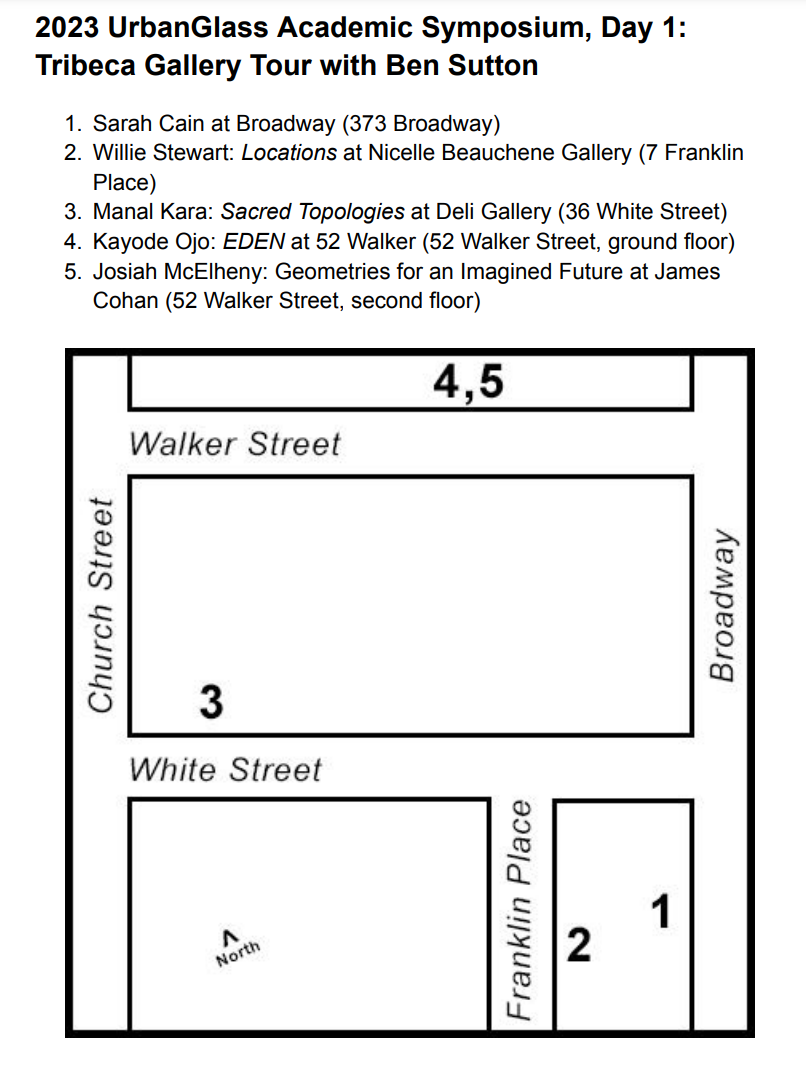
Day 2, Friday November 3, 2023, will begin with gathering at 9:30 AM on the 1st floor of UrbanGlass, with light refreshments, as opening remarks begin at 9:45 AM to kick off a day of engaging presentations by.

10:00 AM Following the Glass: the material life of batch from mine to furnace
Presented by Erin O'Connor, Ph.D.
Following the Glass maps the material life of glass ‘batch’ from the mine to the furnace across studio, industrial, and colonial American glassmaking history. Oft-regarded as an artistic medium, the ‘materiality’ of glass - its constituent components, their social histories, and their trajectories of becoming in relation with humans - tends to be overlooked. Yet, it is by turning to this rich field of becoming that an alternative studio glassblowing history can emerge - one that both challenges the acclaimed ‘break’ from industry and connects today’s practice to roots in the body-mind-world paradigms of settler colonialism and Western expansion. Following the mineral reserves of the south-eastern United States - home to the purest silica quartz in the world- to today’s contemporary glass studio, this project interrogates the everyday notion of glass as a medium with the materialities that have shaped it. Shifting the question of natural resources from sustainability (human use) to materialities (human/non-human becomings), glass reveals itself as so many mineral journeys of self and world making.
Erin E. O’Connor is an Associate Professor of Sociology in the Department of Politics and Human Rights and Affiliated Faculty of Environmental Studies at Marymount Manhattan College. She is a 2023 recipient of the Rakow Grant for Glass Research at the Corning Museum of Glass, author of the book manuscript, Fire-Craft: art, body, and world among glassblowers, and has published in both leading journals and international monographs, including Craft and Design Practice from an Embodied Perspective (forthcoming), Craftwork as Problem Solving: Ethnographic Studies of Design and Making, and Studio Studies: Ethnographies of Creative Production.

11:30 AM Glass as a Meeting Point
Presented by Nadania Idriss
Berlin Glas opened in 2011 with a mission to bring glassmaking to Germany’s capital city; and since it opened its doors, it has created a series of free public programs that bring people together and build community. Like many urban centres, Berlin is a multicultural hub. Using glass and the process of making with glass as a meeting point, Berlin Glas's workshops have become a platform for dialogue, respect, and cultural understandings. The underlying significance of these workshops is not just broadening knowledge and skills, but making an effort to create a culture of peace. In this presentation, Nadania will present 3 of Berlin Glas’s programs: Multaka-Berlin Glas Workshops, the Kiez Mobil, and the studio’s joint-university classes with the city's three largest art schools.
Founder and managing director of Berlin Glas e.V. and Berlin Glassworks, Nadania Idriss was born in Berkeley, California, and studied medieval art and architecture of the Middle East. She worked in Education Services at the British Museum in London, moved to Paris in 1998 to work at UNESCO, and in 2005, she moved to Berlin. She will tell you that opening the studio was a culmination of everything she considers to be her purpose: creating a platform for artist collaborations; classes for the general public; programmes with youth and migrant communities; artist residencies; bilateral exchanges with international universities; and teaching sculpture classes at the art academies in Berlin. She is currently Vice-President of the Glass Art Society.
Lunch Break
2:00 PM Making, Writing
Presented by Mary Drach McInnes, Ph.D.
This professional development session is based on my annual seminar that examines the relationship between making and writing in the contemporary artworld. In a 90-minute workshop, I will lead people through three segments, beginning with sharing my syllabus and online resources; then conducting a participatory session on “openings” that demonstrate a short, in-class writing exercise; and finishing with a series of assignments and how to evaluate them. Teaching our glass students how to navigate the demands of professional communication is essential to their future success. And, in turn, this activity positively affects the increasing critical acceptance of glass production in the greater artworld.
Dr. McInnes is a professor of art history with a focus on sculpture at the School of Art and Design, Alfred University. Her engagement with specific materials—glass and ceramics—that lie outside the mainstream art historical framework has been a significant element in her rethinking of modern art. This material inquiry has led to new research that broadens and repositions the critical boundaries of those areas. Her texts and lectures provocatively ask members of the glass and ceramic communities to question their received history and to expand their references for contemporary art production.
McInnes has been a strong advocate of professional development for young artists in her courses and webinars. This campus activity recently developed into an array of online offerings that encourage artists at all levels. New workshops—“Articulating Your Practice,” “Writing Your Website”, and “Funding Your Practice”—offer essential writing skills and strategies to promote one’s career.
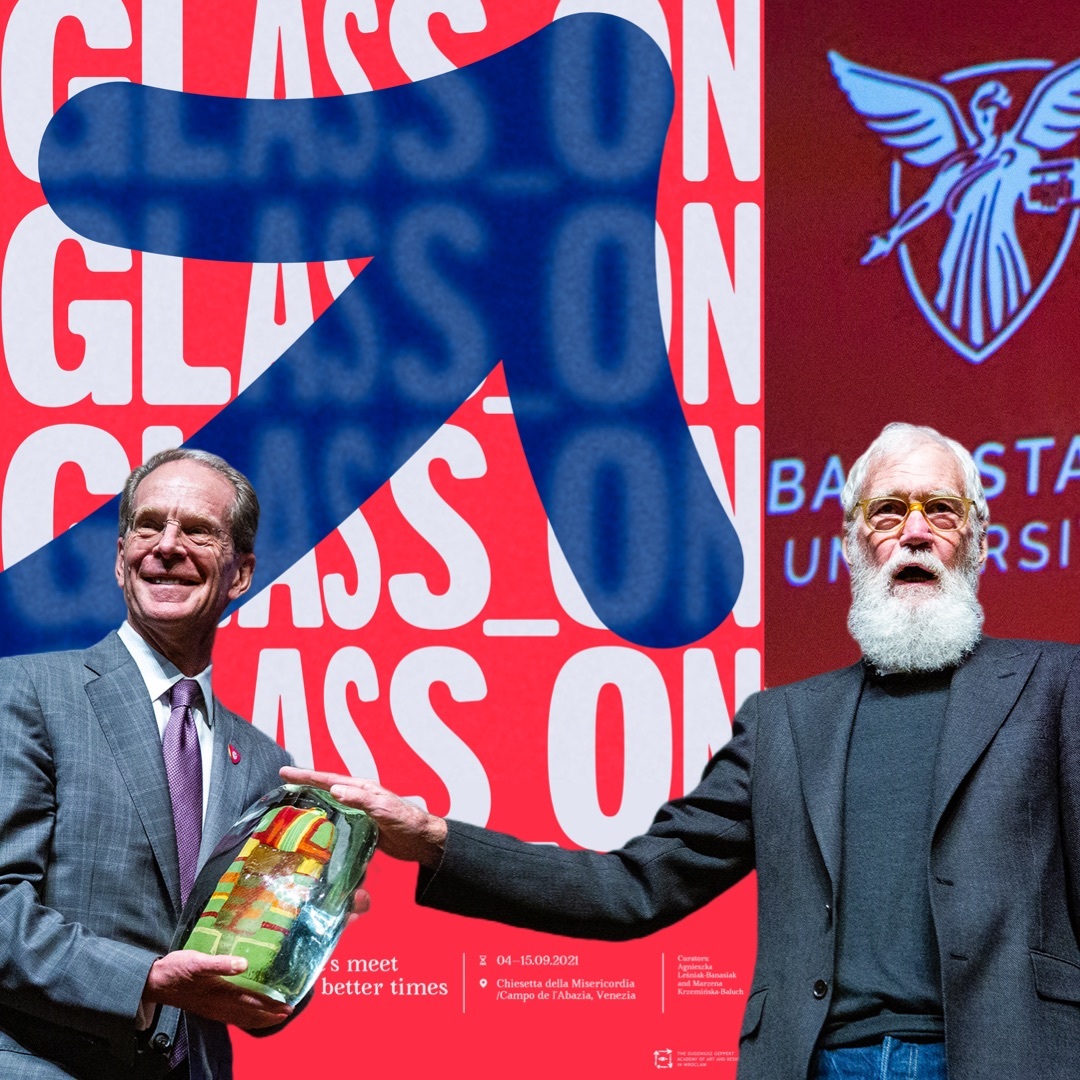
3:45 PM From Classroom to Boardroom
A panel discussion moderated by Jennifer Halvorson, with panelists Robin Cass, Ph.D., Brent Cole and Marzena Krzeminska
This glass educators’ panel discussion is a conversation about advocating for glass programs within higher education through Special Projects, Community Outreach, and Fundraising. The panel will not only review what has been done, but how it has been communicated with the administration. All three members of the panel are glass artists, who are also educators with administrative experience. The aim of this panel is to share points, language, and conclusions that have strengthened the existence of glass programs within an ever-changing landscape of higher education.
Jennifer Halvorson is an artist and educator. As Associate Professor at Ball State University, she has served as Graduate Coordinator and College Leadership Fellow. Currently, Jennifer is Associate Director of the School of Art focusing on curriculum and assessment. Jennifer earned BFA degrees in Glass and Metal at the University of Illinois, Urbana-Champaign. She studied abroad at the Australian National University in Canberra. After completing undergraduate studies, Jennifer traveled to Denmark as a Fulbright Scholar where she studied at Danmarks Designskole in Copenhagen and became assistant to artists Steffen Dam and Micha Karslund. Jennifer earned her MFA from Rochester Institute of Technology. She has been a resident artist at Wheaton Arts, Southern Illinois University, and Toledo Art Museum. Jennifer’s work has been exhibited internationally and throughout the US and is part of permanent collections at the UK National Glass Centre in Sunderland and Fort Wayne Museum of Art in Indiana.
An artist, educator and academic leader, Robin Cass, Ph.D. has been faculty at the Rochester Institute of Technology (RIT) in New York for 24 years. She has a doctorate from Northeastern University, an MFA from Alfred University, and a BFA from the Rhode Island School of Design. Her research interests include the future of post-secondary arts education and the benefits of integrating the arts across the curriculum. Cass serves as Director of Creative Engagement at RIT where she is launching an enrichment initiative for STEM undergraduates, the Art Experience (ArtEx) program. She previously served as interim dean of the College of Arts and Design then led the advancement of RIT’s efforts to foster integration of technology, the arts, and design across nine colleges. Her artwork explores themes of discovery, display, and wonder. She has exhibited work, lectured, and taught at venues across the United States and abroad.
Holding a BFA from the Cleveland Institute of Arts and an MFA from the University of Illinois, in 2010 Brent Cole assumed the lead faculty position for Ball State University’s glass program at the Marilyn K. Glick Center of Glass in Muncie, Indiana. Prior to this appointment, he served for six years beginning in 2004 as Visiting Assistant Professor of Glass at the University of Miami, Coral Gables. Over the years Cole has participated in several artist residency programs including the Appalachian Center for Crafts, Ucross, the Headlands Center for the Arts and Starworks. His work has frequently been exhibited at Art Basel Miami and included in prestigious museum shows at the North Carolina Museum of Art, Raleigh, North Carolina and the John Michael Kohler Center for the Arts, Sheboygan, Wisconsin.
Marzena Krzeminska received the Master of Arts degree at the Eugeniusz Geppert Academy of Fine Arts in Wrocław in 2006. Since 2007, she has been employed at the diploma-granting Art Glass Workshop. Since 2016, she has been working as the Internationalization Commissioner at the Eugeniusz Geppert Academy of Fine Arts in Wrocław. In 2018, she received the Doctor of Arts degree at her alma mater. Currently The Dean of Glass and Ceramic Department at The Eugeniusz Geppert Academy of Fine Arts in Wrocław, Poland. Marzena work can be found in museum collections at the Glass Museum Alter Hof Hertig, Coesfel-Lette, Germany; Museum Jan van der Togt, Amstelveen, Holland;Glass Heritage Centre, Krosno, Poland; Lower Silesian Society for the Encouragement of Fine Arts, Wrocław, Poland; Karkonoskie Museum, Jelenia Góra, Poland; M. Glick Glass Centre, Muncie, IN, USA, Rakusuitei Art Museum, Toyama, Japan; National Gallery, Wroclaw, Poland, the European Museum for Modern Glass, Coburg, Germany; Achilles Stiftung, Glasmuseum Hamburg, Hamburg, Germany and in private collections in Poland and abroad.
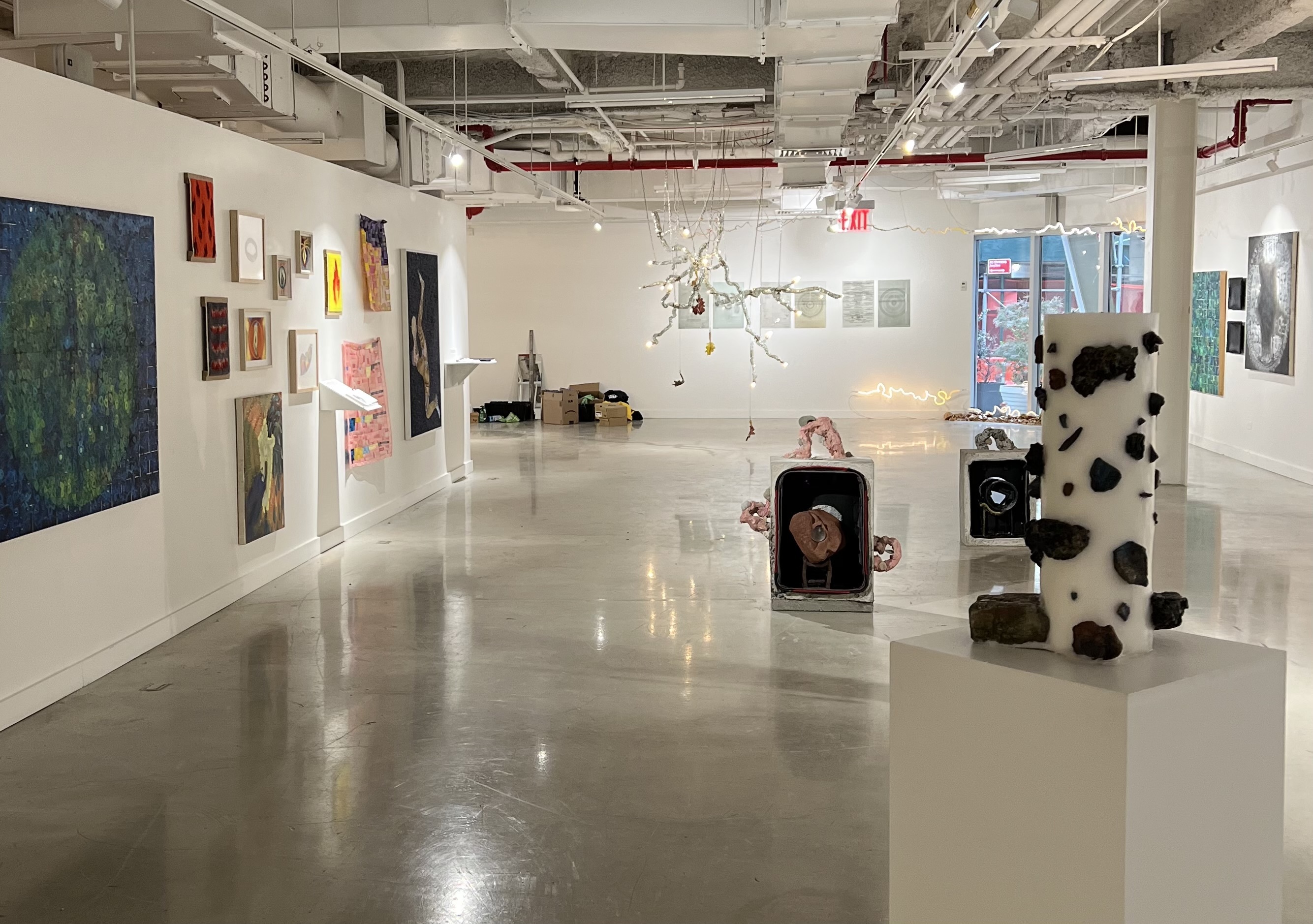
5:30 PM Artist Talks in the Agnes Varis Art Center [UrbanGlass Gallery]
Artist Tsohil Bhatia, Jessi Li and Megan Dyer will share about their work on view in Form and Formless: Constellations of Knowledge. The diverse works from eighteen artists is exhibited throughout the gallery to eschew singular storytelling and instantiate multiple narratives for the fourth and final exhibition of 2023 curated by Alpesh Patel.
Alpesh Kantilal Patel is associate professor of contemporary art at Tyler School of Art and Architecture, Temple University, Philadelphia. His art historical scholarship, curating, and criticism reflect his queer, anti-racist, and transnational approach to contemporary art. He is the author of Productive Failure: Writing Queer Transnational South Asian Art Histories (2017) and is currently working on his monograph Multiple and One: Writing Queer Global Art Histories, under contract with Manchester University Press.
Day 3, Saturday November 4, 2023 more presentations continue in the studio on the 3rd fl of UrbanGlass starting to gather at 9:30 AM:

9:45 AM Designing Makerspaces to Support Fine Arts
Presented by Erin Taylor
In recent years, there is a new emphasis to introduce both STEM and STEAM at all levels of education. With the emergence of digital fabrication, i.e. 3D printing, laser cutting/etching, CNC, and 3D scanning, implementation of these new technologies can be daunting. This presentation will serve as a guide for creating an environment to support digital fabrication. Examples will also be given on how these tools can be used in conjunction with glass education.
Erin Taylor obtained a Master of Fine Arts degree in glass at Southern Illinois University Carbondale in 2015. He previously earned a Bachelor of Architecture degree from the University of Kansas and worked in the building design profession for over fifteen years. For the past ten years, Erin has been working as a Digital Fabrication Specialist at multiple universities throughout the U.S. He has utilized his years of experience in architecture, sculpture, installation, wood-working, metal-working, photography, video, glass, and digital fabrication to assist in the design of multiple labs and maker spaces at these universities. Erin is currently a Digital Fabrication Lab Specialist for the School of Art and Design and the School of Engineering at Alfred University in western New York.
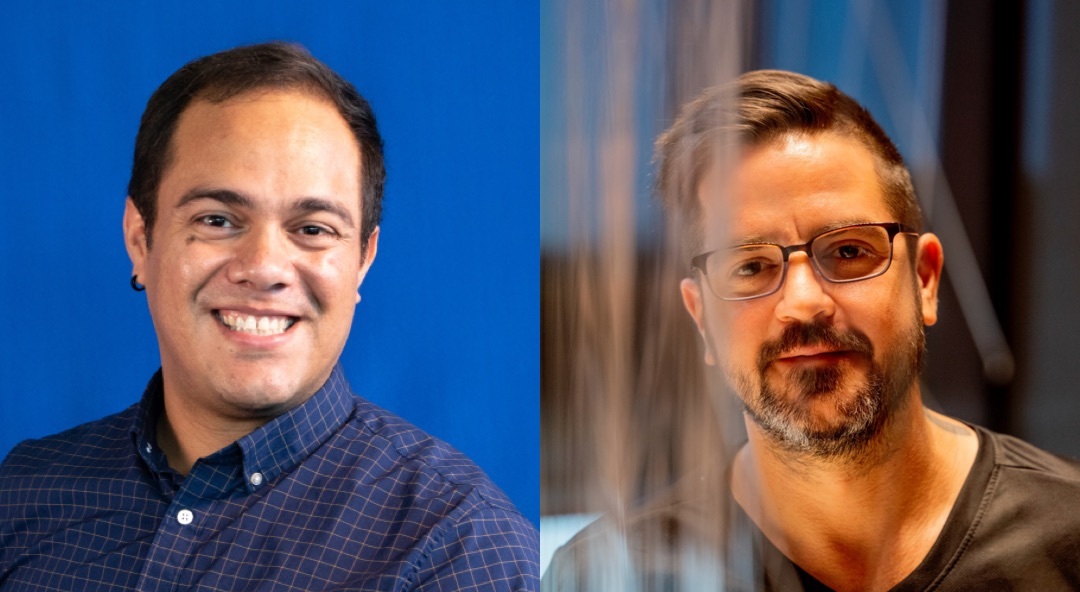
11:00 AM The Maker Research Experiences for Undergraduates: Developing Creative Technologies within Material Practices
Presented by Justin Ginsberg and Cesar Torres
While a core advantage of technology is automation and abstraction, it has also contributed to removing practitioners from directly interacting with materials. These material-based interactions are central to how experiential knowledge develops and are core contributors of creative cognition. In this talk, we explore how creative technologies could instead enhance our relationship with physical materials. Funded by the National Science Foundation, this presentation shares the positive results of collaborative art and technology Research Experiences for Undergraduates (REU). In the course of making smart punty rods and designing artificial intelligence (AI) models to support expert and amateur glassblowers, we’ll show how these research activities also established a graduate pathway to STEAM fields, developed positive coping mechanisms around open-ended research questions, reinforced maker competencies through experiential learning; and improved feelings of inclusion within maker-research communities.
Justin Ginsberg was born and raised in Dallas Texas, before traveling nationally and internationally learning from practicing artists. Since 2013, he has been the head of the glass area and assistant professor at the University of Texas at Arlington, and is now the Assistant Chair of the Art and Art History Department. His personal creative practice and research focus on the systems and structures we use for understanding the world around us. He questions the known and orderliness, while also bringing context to the unknown and chaotic. He considers process and action as he explores the perceived boundaries of materials and the presumed nature of things. Recently, he has focused his practice on collaborative work with a focus on the politics of attention, as well as implications of new technologies. He is currently represented by the Traver Gallery in Seattle, Washington.
Cesar Torres is an Assistant Professor in Computer Science & Engineering at the University of Texas at Arlington. His research and teaching explore the intersection of digital fabrication and craft practices to examine the dialectical relationship between the digital and physical, the material and immaterial, theory and practice, the academic space and the community space, and the professional and the amateur. As a design technologist, he synthesizes new media and craft theory into the design of software and hardware systems and tangible user interfaces. He has received multiple best paper awards at top-tier venues within Human-Computer Interaction and is the recipient of the NSF CRII and REU Site grants.
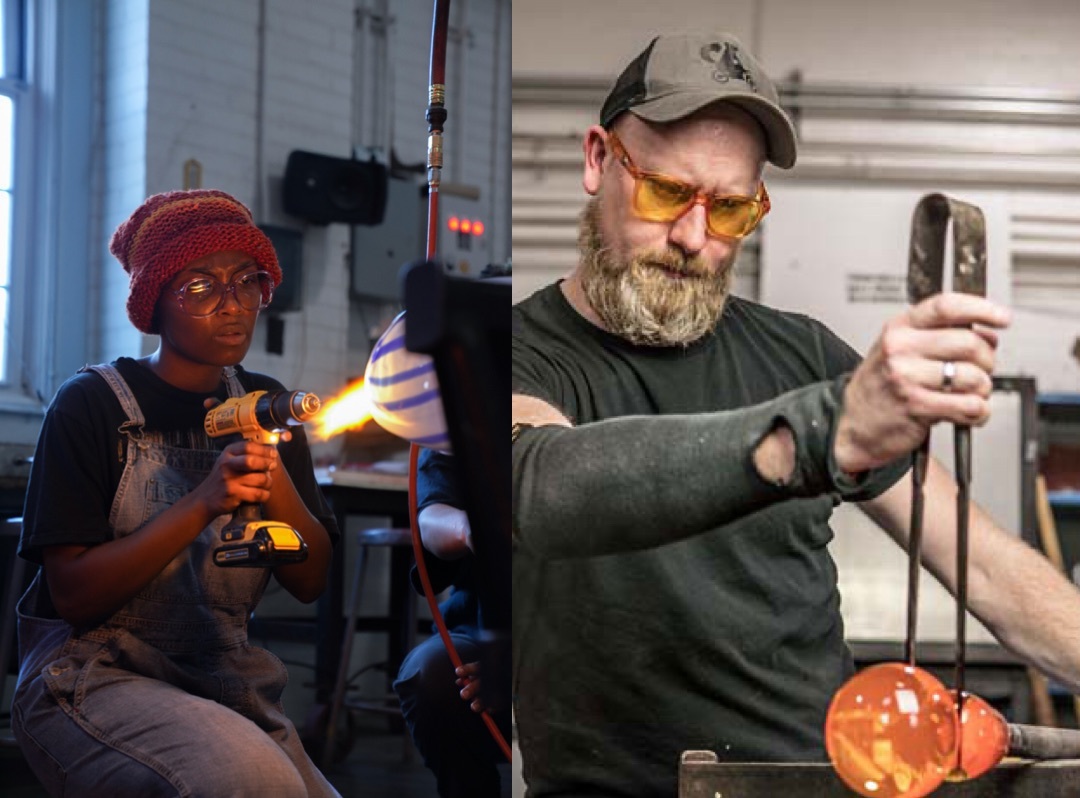
12:15 PM How to create moments of collaboration between students an educators
Presented by Adeye Jean-Baptiste and Angus Powers
Within academic institutions finding moments to collaborate between students and faculty can be challenging. Connecting on a shared interest to then executing a project can seem daunting. By using the black glass artist series as a case study Adeye and Angus will share some of the steps on how they made collaboration possible.
Adeye Jean-Baptiste is a recent graduate of Alfred University, where she received her BFA. Their work focuses on vehicular movement from the perspective of those who are non-native to a given space or place. The core of their practice however is rooted in community. This has led them to be a co-facilitator for the GEEX community table group as well as co-create Alfred University’s Black Glass Artist series.
Angus Powers, Professor of Glass is currently the Glass Area Head at the New York State College of Ceramics at Alfred University. Angus’ attended the New York State College of Ceramics at Alfred University where he earned his BFA and received his Masters of Fine Art degree from Tyler School Of Art, Temple University. His work has been experimental and has meandered through all types of venues and has focused on glass, light, technology, craft, and design. He has work in the collections of Museum of American Glass and the Glasmuseet Ebeltoft (Glass Museum in Ebeltoft), in Denmark. Powers has done live demonstrations at 4 Glass Art Society conferences and sat on the on jury or New Glass #36 a publication from the Corning Museum of Glass after being published in the review three times. He has led workshops at The Haystack Mountain School of Crafts, The Studio at the Corning Museum of Glass and is a recipient of three Excellence in Teaching awards in his tenure at Alfred University.
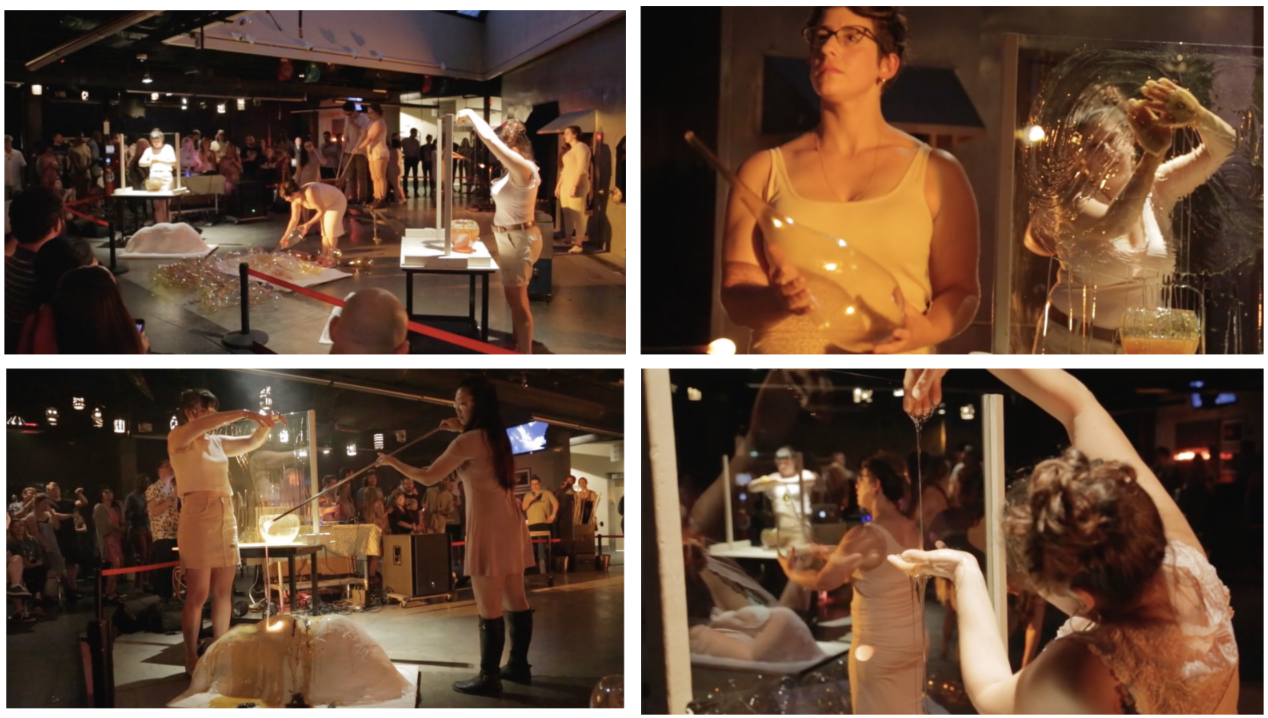
2:15 PM Performance as Pedagogy
A panel moderated by Suzanne Peck with guest specialists
Performance is a powerful doorway in the glass classroom. Performance using hot glass creates space for a gamut of artists- the technical neophyte, the deskilled maestra, the quiet materialist, the bombastic extrovert. These many points of entry make performance especially useful from a teaching perspective. How is this art form being harnessed in the space of learning and scholarship? How and where does performance enter glass pedagogy?Prompts such as these guide a curious and critical panel discussion between some of the community's glass-and-performance leading minds.
Suzanne Peck is a visual artist, writer, curator and educator. She earned her MFA from the Rhode Island School of Design’s glass department. Indeed, glass provides continued inspiration in her work, even when the substance itself is absent (isn’t glass always, in a way, absent?). Using glass, photography, digital video and new media, her art practice considers touch, interconnectivity and skin through the lens of sculpture and installation. Her work is exhibited worldwide and held in both public and private collections. Suzanne is the Charlotte Mowris Endowed Fellow, Glass Program co-Chair at Rochester Institute of Technology.
Tracy Stonestreet is an artist, writer, and educator. She is currently Gallery Director at University of Mary Washington. Previously, she was an assistant Professor of Contemporary Art and Performance at Virginia Commonwealth University School of the Arts. Prior to this role, she was an assistant professor of Fine Art at Hampton University, and served as the guest editor for the International Review of African American Art. Tracy holds a PhD in Media, Art, and Text from Virginia Commonwealth University, an MFA in Studio Art from the University of North Carolina at Chapel Hill, and bachelors’ degrees in History and Art & Design from North Carolina State University. Her work has been published in the International Review of African American Art, Art Documentation, and Humanities Across the Arts.
She conducts visual and scholarly research at the intersection of contemporary art, feminist theory, and time studies, with a particular interest in the relationship between performance art and long-lasting art objects. Current projects include articles on American artist EJ Hill, museum archival practices, and the global artistic shifts toward liveness during the twenty-first century.
Raegan Truax considers time to be a potent political material.
Truax makes durational performances to bend, suspend, and manipulate assumptions about time and the body. She is interested in exploring new ways of being in relation to the world and each other. They use performance to communicate, to ask questions, and to experiment with a multitemporal world of vibrations and sensations.
Truax received thier PhD from The Department of Theater and Performance Studies at Stanford University and hold an MA in Performance Studies (NYU) and an MA in Gender Politics (NYU). She previously developed and taught courses in Performance Art, Performance Theory and Practice, and The Art of Duration in the Critical Studies Department at California College of the Arts. From 2020-2023 she was Mellon Post- Doctoral Fellow in the John B. Hurford ‘60 Center for the Arts and Humanities and Visiting Assistant Professor of Visual Studies and Gender and Sexuality Studies at Haverford College. Truax is currently an independent artist and the founder of ON DURATION, an intergenerational and international platform that supports durational artists to engage in collective creative research and public praxis.
3:45 PM A Two-Way Mirror: Double Consciousness in Contemporary Glass by Black Artists
Presented by Jabari Owen-Bailey
A Two-Way Mirror is a presentation inspired by an exhibition of Black artists who have used glass to create work that deconstructs, cultural, gender, and racial identity. Due to its reflectivity and translucence, glass is an apt medium to interrogate identity. This exhibition explores the historical representation of Black people through glass as well. Glass art has been devoid of access for historically marginalized people. This exhibition cannot rectify this but can explore inequity of this history and offer works by Black Artists that tell their own stories.
Jabari Owen-Bailey is an arts administrator, educator, artist, and Curatorial Education Program Manager for Museum of Glass. Jabari received his Bachelor of Fine Arts degree from Corcoran College of Art + Design and his Master of Fine Arts degree from the School of Visual Arts. His varied career in arts administration has shaped his values on diversity and inclusion in the museum and arts fields and his beliefs in the personal healing powers of creating.
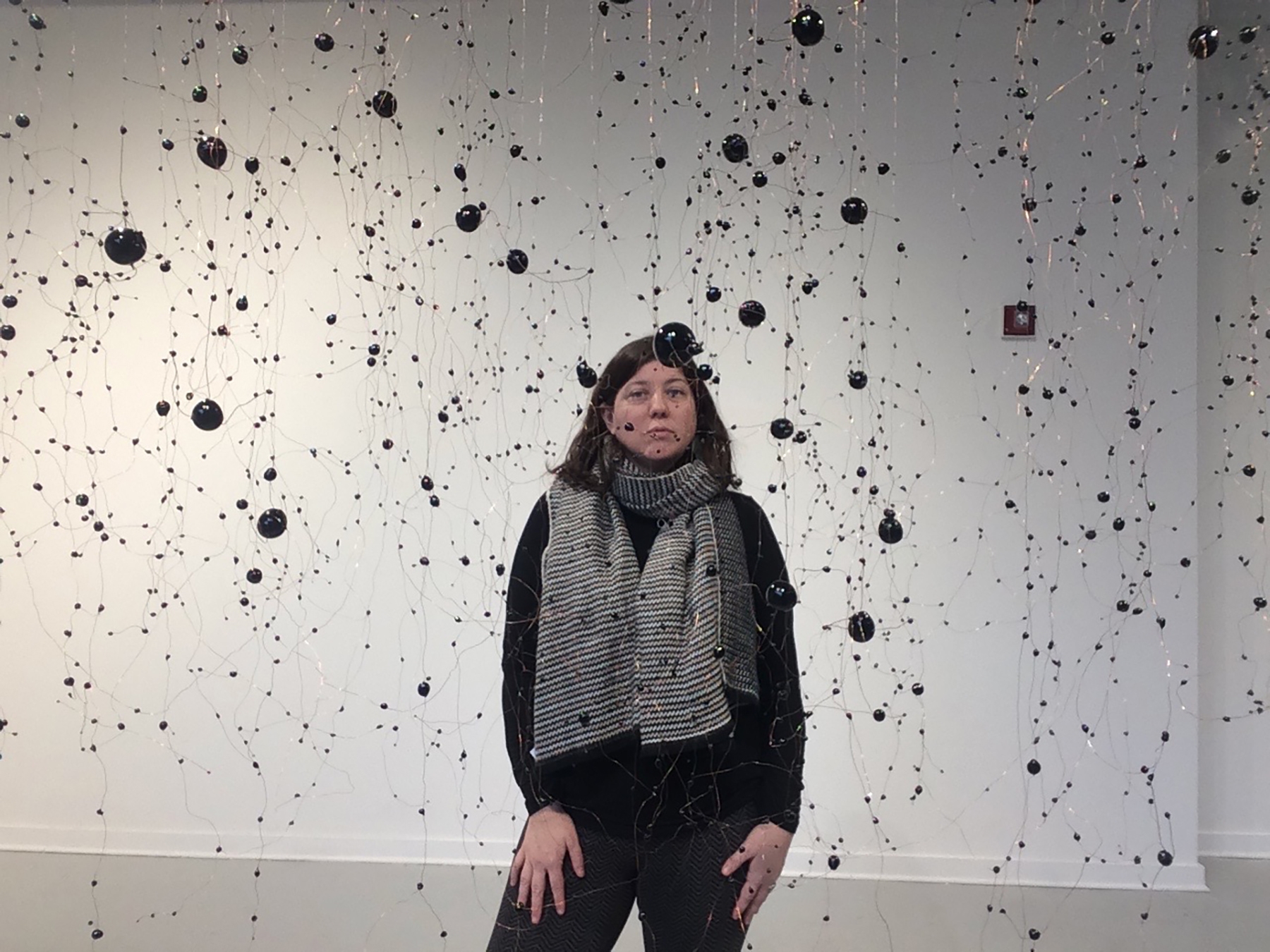
5:00 PM Fostering a Culture of Positivity and Community in Glass Education: Addressing Shame as a Barrier to Learning and Growth
Presented by Jessica Jane Julius
Glass education has long been plagued by a culture of shame, where learners open feel inadequate and unworthy due to normative tools of motivation. This lecture aims to delve into the detrimental effects of shame on learners’ creativity, hindering their ability to learn and grow. Moreover, this shame-based culture perpetuates social and cultural elitism, favoring privileged learners and inhibiting diversity and inclusion within the field.
By identifying the sources of shame within the glass education environment exploring faculty behaviors, this lecture proposes alternative approaches to motivation that create a safe and supportive space for learners. Strategies such
as peer-to-peer learning, collaborative projects, and mentorship will be highlighted as effective means to foster a culture of positivity and mutual support, enabling learners to overcome their insecurities and develop their skills. Additionally, this session will address the transmission of skill in glass education and how it socializes learners to align with the social and cultural elite represented by the educator. The lecture will propose strategies to de-centralize the faculty and re-organize the dynamics of the classroom, eliminating the notion of a singular “master” and allowing for fluid and innovative pedagogical approaches.
Jessica Jane Julius has been dedicated for 15+ years to the arts as an artist, educator, collaborator, and performer. She has a history of exhibiting large scale installations, objects, and imagery that reflect on the current "culture of fear" in our society, making work that evaluates where fear is manifested and cultivated. She is the co-founder artists’ collective and performance group The Burnt Asphalt Family who produces collaborative participatory works. They have performed at prestigious venues across the country including The Studio at Corning Museum of Glass, The Chrysler Museum, and Urban Glass. Her mixed media works have been exhibited nationally including the Philadelphia Museum of Art, The Museum of American Glass, NJ, and Pilchuck Gallery in Seattle, Washington. Her work has been selected numerous time for publication in New Glass Review and she has been awarded residencies at The Creative Glass Center of America in Millville, New Jersey, and The Museum of Glass in Tacoma, Washington. She is on the board of the Glass Arts Society and was recently appointed to the Executive Committee as the Vice President. In the past, she served as Interim Program Head of Glass at Tyler School of Art and University of the Arts, and has also taught at RIT, Pilchuck Glass School, Urban Glass, and The Studio at Corning Museum of Glass. She earned her BFA in Glass at Tyler School of Art and MFA in Glass at Rochester Institute of Technology. Currently she is an Assistant Professor in Glass at Tyler School of Art, Temple University and lives in Philadelphia with her husband and son.
Closing night festivities starting at 7:30PM hosted by Erica Rosenfeld, artist, long-time community member and Director on the UrbanGlass Board.
Don't miss out on this incredible event – buy your tickets now!


